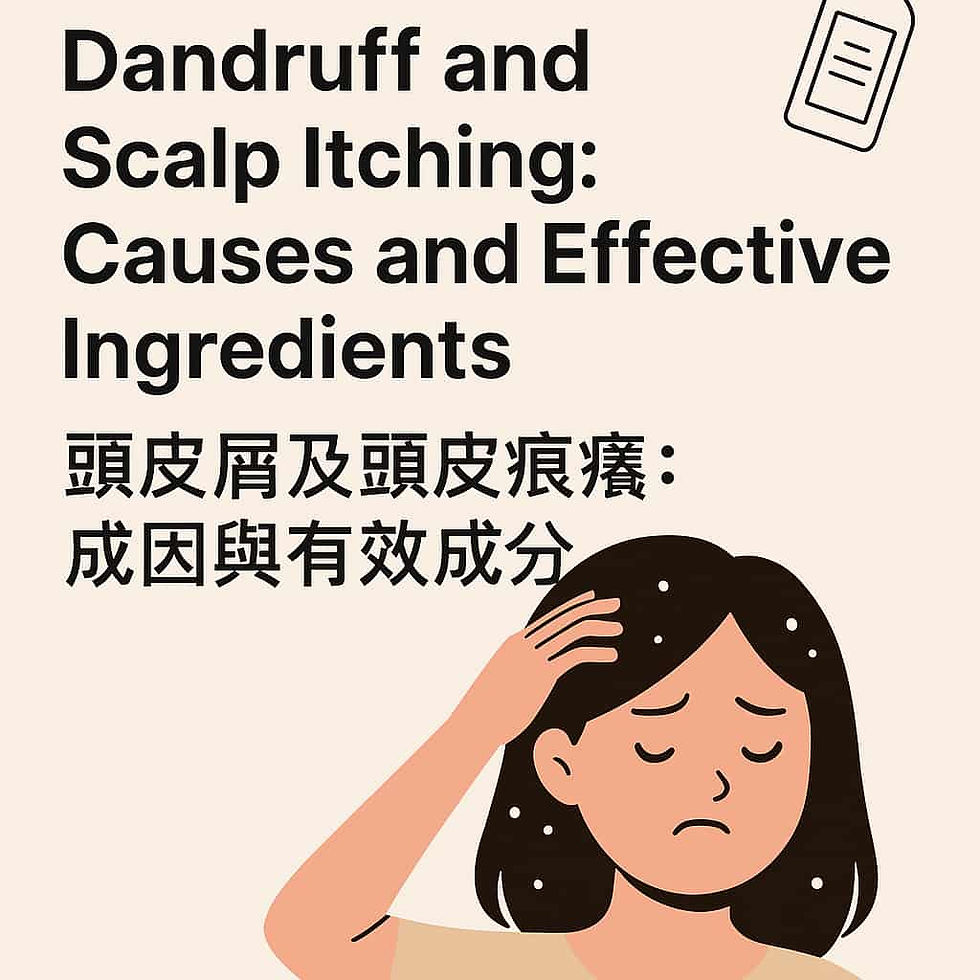Scientifically Proven Solutions to Dandruff and Itchy Scalp Issues
- EHD-HK.COM

- Apr 7, 2025
- 2 min read
Dandruff and scalp itchiness affect many individuals long-term. Recent scientific studies reveal that these conditions aren't merely caused by "excessive sebum" or "inadequate cleansing", but rather complex interactions involving the scalp microbiome, inflammatory responses, sebum metabolism, and neurological sensitivity¹.
Today, from a scientific perspective, we explore the genuine causes behind dandruff and scalp itchiness and recommend the most effective scalp care treatments supported by research.

Causes of Dandruff and Scalp Itchiness Explained:
Excessive Malassezia Growth¹Malassezia is a fungus naturally present on the scalp. Under conditions like increased sebum production or weakened immunity, this fungus multiplies rapidly, producing irritants causing dandruff and itching.
Impaired Scalp Barrier²When the scalp’s protective barrier is compromised, external irritants penetrate easily, triggering sensitivity, inflammation, and itching.
Abnormal Sebum Metabolism²Both excess and insufficient sebum can disrupt scalp balance, leading to microbial growth and discomfort.
Chronic Inflammation and Immune Response³Chronic inflammation sensitizes scalp nerves. Inflammatory mediators like IL-31 and IL-33 further irritate nerve endings, causing persistent itching.
The Link Between Scalp Acne (Folliculitis) and Scalp Health
Beyond dandruff and itching, scalp acne (folliculitis) is another common scalp issue. It occurs when hair follicles become inflamed due to bacterial infection, excess sebum, or blocked pores. The main causes include:
Bacterial Infection: Often caused by Staphylococcus aureus, which enters compromised skin and triggers inflammation.¹⁴
Sebum and Keratin Buildup: Accumulated oil or poor cleansing leads to clogged pores, creating a breeding ground for bacteria.¹⁵
Chronic Inflammation: Long-term irritation or inflammation may release cytokines like IL-1β and TNF-α, exacerbating folliculitis.¹⁶
Research suggests that untreated dandruff and persistent itchiness may lead to folliculitis. Using a targeted anti-dandruff and anti-folliculitis shampoo helps cleanse hair follicles, regulate oil, and reduce microbial imbalance—essential steps for prevention and care. We will also recommend a few effective shampoos and scalp products with proven benefits for both dandruff and folliculitis.
Scientifically Validated Ingredients and Benefits:
Sea Salt – Gentle exfoliation, removes excess oils and dead skin.
Salicylic Acid – Dissolves dead skin, cleans follicles, reduces dandruff.
Selenium Sulfide – Antifungal, inhibits Malassezia, reduces dandruff and inflammation.
Zinc Pyrithione (ZPT) – Antimicrobial, reduces inflammation.
Glycyrrhetinic Acid – Anti-inflammatory, calms sensitive scalp.
Ceramide and Panthenol (Vitamin B5) – Repairs scalp barrier, alleviates dryness and itching.
K18PEPTIDE™ – Maintains scalp health, strengthens scalp barrier function.
Recommended Scalp Care Products:
Davines SOLU Sea Salt Scrub Cleanser (Sea salt exfoliation for scalp refreshment)
Davines Naturaltech Purifying Shampoo (Anti-dandruff and antifungal control, indirectly relieves itching)
Wella System Professional Purify Shampeeling (Zinc pyrithione for strong antimicrobial dandruff control)
Davines Naturaltech Purifying Gel (Glycyrrhetinic Acid soothes inflammation)
Davines TCC Purity Circle Hair Mask (Ceramide & Vitamin B5 for scalp barrier restoration)
K18 Peptide Prep Detox Shampoo (Salicylic Acid exfoliates and cleans hair follicles)
References:
¹ "Dandruff Is Associated with Disequilibrium in the Scalp Microbiome" (PLoS ONE, 2013)
² "Three Etiologic Facets of Dandruff and Seborrheic Dermatitis" (JID Symposium Proceedings, 2005)
³ "Itching for an Answer: A Review of Potential Mechanisms of Scalp Itch in Psoriasis" (Experimental Dermatology, 2019)



Comments